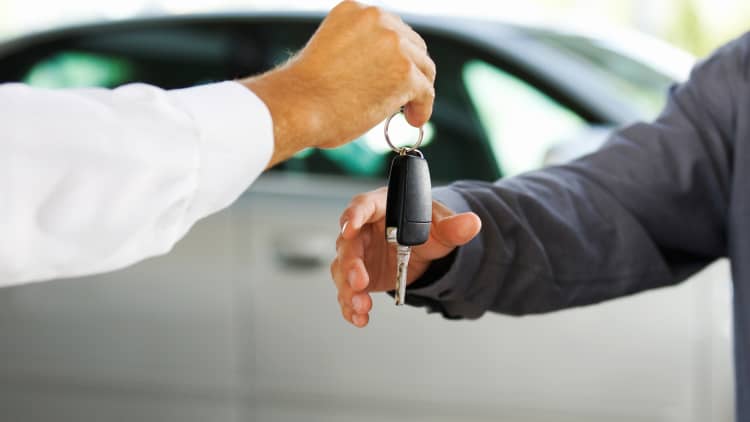
Has a friend or relative asked you to co-sign on a loan recently, essentially linking your good credit to theirs to get financing? If they have, chances are it's been for an auto loan, a new survey has found.
Among co-signers in a CreditCards.com survey of more than 2,000 participants, half have helped someone obtain a car loan — more than twice as many as had helped with a personal loan. Nineteen percent had co-signed on a student loan and 16 percent, a credit card.
Yet co-signing on an auto loan may be a bad idea. Auto loans topped $1 trillion for the first time ever during the first quarter, according to credit-reporting company Experian, with increases in both the share of subprime borrowers and loans that are 30 days and 60 days delinquent.
"Auto is clearly a little stretched, in my opinion," Jamie Dimon, JPMorganChase's chief, said last week. "Someone is going to get hurt. ... We don't do much of that."
Co-signing any debt is a dicey proposition, said Bruce McClary, a spokesman for the National Foundation for Credit Counseling. It ties you to that debt for the life of the loan, meaning you could be on the hook for the entire amount outstanding if the primary borrower can't — or won't — pay up. (The Federal Trade Commission warns that in some states, creditors can even try to extract the money from you first.)
"A lot of people enter into these situations wearing rose-colored glasses," said McClary. "They're not seeing reality where it is and the potential for things to go wrong."
Among the co-signers in the survey, nearly 40 percent found themselves on the hook for at least part of the bill the primary borrower didn't pay, while 28 percent saw a drop in their credit score from that borrower's bad credit habits.
"Most of these people are trying to get their spouse or friend get a leg up financially," said Matt Schulz, senior analyst for CreditCards.com. "They don't necessarily do their due diligence."
Those are big bills to pay. The average new-vehicle auto loan hit an all-time high of $30,032 in the first quarter, according to Experian, while used vehicle loans averaged $20,723 at franchise dealers and $16,124 at independent ones. On the student loan front, class of 2016 grads are leaving college with a tab of more than $37,000, according to Cappex.com.
Before you sign, do your due diligence on the borrower and the loan, said McClary. You should have some sense of what the funds will be used for, how responsible the person is with money and why they need your help. Have a frank discussion about your expectations that the debt will be handled responsibly.
Ask for a copy of the primary borrower's credit report, to gauge whether past issues affecting their credit are really in the past. It's riskier to tie yourself to someone with bad credit, he said: "You're setting yourself up to be a major player in their next big mistake." Another red flag would be if the borrower is leveraging not just your credit but your reported income to obtain a loan that he or she can't afford.
Once you've signed, "make sure you have as much visibility into the account as you possibly can," Shulz said. Ideally, you should have access to see details like the loan balance, and be able to receive notifications for issues like a late payment, bump in the loan rate or requests for a credit line increase.
"With co-signing it's always better to see an issue coming," he said. "You don't want to be surprised by it."




